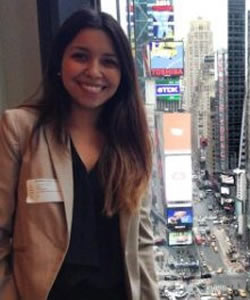Ahoj! (Hi!)
What is time? I have been in Prague for nearly three weeks, I think. These three weeks have consisted of late night café runs, strolls through underground bookstores, walks to the largest castle in the world, and poor attempts at communicating with Czech locals. I also visited the oldest working astronomical clock in the world. The legend says that as long as this clock continues to tick, the Czech Republic will continue to prosper and be free from all harm.
I can say that I have finally settled into a routine: school, eating, and exploring. In addition to eating a lot of meat, bread, and potatoes, I spend a good amount of time learning Czech. I am currently taking a class called “Czech Language and Culture.” At first, I was hesitant to enroll in the course, not only because it met twice a week (while all my other classes meet once a week), but also because I knew absolutely nothing about Czech culture, much less the language.
Adapting to the fairy tale-like buildings has not been as difficult as acclimating to the language barrier. In Prague, very few Czechs speak English. During the first week of class, a number of students asked the professor in different ways why Czech people were so “rude”: “Why don’t they speak English?” or “People are more friendly in America.” These stereotypes and comments are often discussed amongst American students studying abroad here in Prague. I, however, am encouraged by the fact that a Czech walks away or makes what looks like an angry remark when I try to communicate in English—especially at the grocery store. In the first week I purchased granola instead of oatmeal and syrup instead of apple juice. In the past two weeks however, I have made some progress (or prague-ress). I finally learned some essential vocabulary words including máslo (butter), mléko (milk), and sýr (cheese).
Nevertheless, the persistent comments about how “rude” Czechs are along with the American pop music at nearly every restaurant have made me reflect on how the United States interacts with and infiltrates the world culturally. I think we forget how privileged we are to speak English; speaking English should not limit us from trying to engage and learn a foreign language. It is easy to fall into that trap. After all, many countries now use English as a second language.
Transitioning from the fast-paced environment at Georgetown, where I am constantly given information and involved in too many extracurricular activities, I have realized that learning a new language teaches one to be vulnerable, but more importantly, to be present.
Although the language barrier is challenging and often times I feel incompetent, it encourages and motivates me to work twice as hard to learn to hold a basic conversation in Czech. More importantly, I have witnessed how generous Czechs are when I try to put together the very few Czech words I know and make a fool of myself. Making a fool of myself when trying to speak Czech becomes even more rewarding when a Czech person smiles and attempts to help me—and sometimes I even discover they speak a little English after all.
While the language barrier continues to be extremely challenging, it allows me to get a fuller understanding of Czech history and culture. Surprisingly, it also allows me to understand the role of the United States in the world. Prague has witnessed a declaration of independence, Nazi control, oppressive communism, and a capitalist democracy—all within the twentieth century. It is no wonder that Czechs work to preserve their language and culture, which is tied to a national identity that was challenged and silenced under a number of oppressive regimes.

